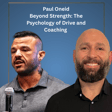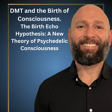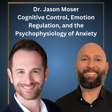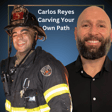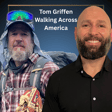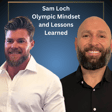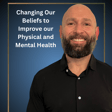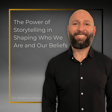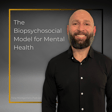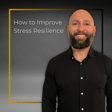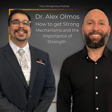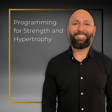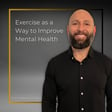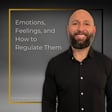Introduction to Dr. Gwen Atid
00:00:01
Tony Montgomery
ah today we talked to Dr. Gwen Atid. Thanks for coming on the show.
00:00:06
Gwen Adshead
No problem. Thank you very much for having me.
00:00:08
Tony Montgomery
Yeah, no,
Exploring Human Nature and Evil
00:00:09
Tony Montgomery
it's a pleasure. I was really excited to get down get a chance to talk to you and you know explore this idea of of human nature and evil and the association that we have with it. And um one of the things you started off with in your audio book is the reason for evil in the world is because people aren't able to tell their stories by Carl Jung.
00:00:30
Tony Montgomery
um Why did you select that quote? And what does that mean for you?
Role of Forensic Psychiatrists
00:00:36
Gwen Adshead
Well, what it means for me um is, and particularly in the context of the book, um because the book is a collection of stories of people that I worked with in my um in my job as a forensic psychiatrist and psychotherapist.
00:00:53
Gwen Adshead
Unlike in the United States, forensic psychiatrists are clinicians who look after people who've committed acts of serious violence when when mentally ill.
00:01:05
Gwen Adshead
um In the States, that that's less common. um and Often forensic psychiatrists just give evidence in court. And we do that too, but we also offer treatment for people who've committed acts of serious violence, typically homicide, when mentally ill.
00:01:21
Gwen Adshead
um And for a long time, I wanted to try and tell um invite people to come and visit the world that I've been working in for the last 30 odd years.
Inspiration Behind 'The Devil You Know'
00:01:33
Gwen Adshead
And my dear friend and colleague, Eileen Horne, who is a professional storyteller and writer, suggested that she help me create the composite stories um that would convey something of the human beings that I've met and the personal relationships that i've I've made in therapy with people who've done terrible things.
00:01:55
Gwen Adshead
um Because I've learned such a lot from this experience. I wanted to share something of that. with with the general population because I've written lots of academic things but Eileen and I were able to create something together which is much more readable for the general public.
00:02:15
Tony Montgomery
Yes, it's ah beautifully intertwined with the the story. um The book is The the Devil You Know. And you do a great job of taking us through um your first kind of like introduction to it with Tony. And then you end with um Jamal towards the end of your career. So we even get to see your journey and how you see the individuals and how how things change and and reflect on you And you, you touch a lot about that in the, in
Empathy and Circumstances in Violence
00:02:46
Tony Montgomery
the book.
00:02:46
Tony Montgomery
um One of the things that I found very interesting interesting is the idea of hearing in the other person's story um allows you to create empathy with them you,
00:02:59
Tony Montgomery
I think in America, some of us think that why should we be empathetic towards people who have committed these violent crimes? um But we know like that's a lot of that is chance and luck, like
00:03:15
Tony Montgomery
We get lucky to be in the situations that we are in from, you know, birth to to where we're at and they didn't get as lucky, you know, so I think you do a good job of exploring that. Is that something that ever crossed your mind of the idea of like, why should we have empathy for these people and why is it important to give empathy for these people?
Understanding Motivations for Violence
00:03:36
Gwen Adshead
Very much so. Those questions were very important to me right from the get-go, I think, because um I think it's very natural. At one level, I think it's very natural for people to feel fear and anger and even hatred towards people who've done something terrible, especially, especially of course, if they've been directly affected by it.
00:04:00
Gwen Adshead
But of course, um one of the things that a criminal court does is to look very closely at people's motives um and the minds behind acts of terrible violence.
00:04:12
Gwen Adshead
And sometimes, just as you say, Tony, sometimes what we find are not kind of cruel and unusual um intentions to kill, but actually a terrible combination of mental illness, childhood trauma,
00:04:14
Tony Montgomery
Thank you.
00:04:28
Gwen Adshead
intoxication, our fear and kind of collapse of all the social supports that make life pleasant and sustainable. um And that the violence erupts out of a combination of these risk factors that in fact possibly any of us might find ourselves getting into.
00:04:48
Gwen Adshead
And that's kind of one of the big messages of the book is that violent states of mind are probably something that any of us could get into if the right factors all lined up together.
Rehabilitation and Addressing Violent Minds
00:04:59
Gwen Adshead
And that's really important in also in terms of not only perhaps not going into automatic hate mode every time you think of somebody who's done something horrible, but also raises very interesting questions about how we should rehabilitate offenders who've gone to prison after acts of violence. What should we do for these men and women?
00:05:22
Gwen Adshead
um in order to make them safer in the future. So it has a really practical question to it as well.
00:05:29
Tony Montgomery
Yeah, no, definitely. And you you paint a beautiful metaphor in the book of the the bike lock and every risk factor is a almost like a cog in in the and the lock and it just clicks and it clicks. And then finally, there's one thing that's going to open the lock and and you have this break. And we know when it comes to like bipolar disorder and schizophrenic breaks, like they they can happen later in life.
00:05:53
Tony Montgomery
based off of just one thing that is, um when you look at it, could be entirely like irrelevant to what they have going on. um And it's an interesting way to to look at things because you do realize that, yes, these things could stack up and in my life and I could be susceptible to this as well. So maybe the thought of being able to um understand my story a little bit better it could be helpful for me as as well.
Victim's Experience in Therapy
00:06:21
Gwen Adshead
i think that's I think that's a really nice way of looking at it. And my my friend and colleague, Peter Aylwood, kind of first came up with this idea about a bicycle lock, and he wondered whether the last number in the lock was something that linked up with people's memories of childhood trauma.
00:06:38
Gwen Adshead
And I think that that's definitely possibly one of the risk factors um that can be important. And that's really, and it's important to think about because we have many people who have experienced childhood trauma And sometimes in certain circumstances that could contribute to increasing their risk of violence.
00:06:56
Gwen Adshead
It doesn't make them violent, but it could be something that just contributed to being in that state of mind. But the other thing that I thought ah of using Peter's model and developing it a bit was that last interaction between the victim and the perpetrator.
00:07:12
Gwen Adshead
may be the thing that really actually activates the violence, unleashes it, unlocks it, if you like.
00:07:15
Tony Montgomery
Thank you.
00:07:18
Gwen Adshead
And so understanding what happened at the time of the killing is really important, I think, to trying to understand risk, both in this person um and also generally. And it also reminds us that we need to take the victim's experience very seriously. So part of my work as a therapist and psychiatrist with offenders is never about putting the victim's experience out of my mind.
00:07:45
Gwen Adshead
The victim's story is always there because I remember that this person I'm working with is often the last person they saw and it's part of my job to keep the victim and their experience and their family's experience in my mind.
00:08:00
Tony Montgomery
Yeah, and when you when you keep that salient in your mind and you work with um the offenders, is there is there some incongruency with the back and forth of like I have the victim in my mind and then I have the perpetrator. How can i be soft and kind with the perpetrator when the victim is there? Or do you compartmentalize that a little bit more as you're doing the therapy and in in the stuff?
Building Trust with Offenders
00:08:28
Gwen Adshead
I think there's a bit of compartmentalization that goes on. But of course the work that I'm doing is is always kind of geared towards helping the perpetrator understand more of what they've done, how they came to let themselves do a terrible thing, and how they might keep themselves safe in the future.
00:08:49
Gwen Adshead
So sometimes having the victim perspective and sharing that with the perpetrator in therapy um is actually quite important part of the process.
00:09:01
Gwen Adshead
But of course, the the patient has to be ready for that. And you don't just barrel in and do that the first time you meet someone. And of course, we don't do that in any kind of accusatory or kind of threatening kind of way you have to build up a relationship with someone a relationship of trust which means that when you get to want to talk about really tough things you know they know that they are safe with you and that you are really trying to understand because you think that that will be helpful to them as well as to a wider society
00:09:39
Tony Montgomery
Yeah, no, that makes a a lot of sense. And I think the idea of building trust is something that can be valuable in any relationship. um But what are the, like,
00:09:50
Tony Montgomery
What are the steps to to do that, especially working with um these offenders where ah they've probably been put in a system where trust is not something that comes naturally to them? um you know i would I would assume that actually caring about understanding their story can start to build trust, but is there anything specifically that you look for and look to do to um consolidate that trust mechanism?
Therapeutic Alliance and Positive Outcomes
00:10:18
Gwen Adshead
ah Yes, i think there are some I think there are a couple of things that are really important.
00:10:21
Tony Montgomery
Thank you.
00:10:24
Gwen Adshead
I mean, first to say is that we know from all the research on psychotherapy outcomes that the only way you get a positive outcome is if you have a therapeutic alliance with the person. So it doesn't matter what kind of therapist you are, if you want a good outcome with this person, you're going to have to build a therapeutic alliance. So So we know that's important.
00:10:45
Gwen Adshead
And as you say, for many people that I work with, they've experienced lots of childhood adversity, adult adversity, victimization and abuse, as well as a terrible no process of having been and know being convicted of something horrible, spending time and in jail and jails and prisons.
00:11:03
Gwen Adshead
So as you say, trust doesn't come easily to them. And they find it hard to trust. So the kind of basic things that we do, certainly I do, is to not expect to be trusted from the get-go.
00:11:19
Gwen Adshead
So is to keep my expectations pretty low. um and to let the other, know to let the person know that I understand that there's no particular reason that they should trust me.
00:11:30
Gwen Adshead
And that we don't know each other very well. And and actually goes both ways. you know that that trust a trust will have to be built over time but one of the ways that we can do that is to keep to an agreement about meeting so I agree to try and be there on time and stay in the room and carry on working and not go away not leave them abruptly and they agreed to come and do their best to kind just kind of stay with what they're doing and
00:12:01
Gwen Adshead
Actually, a lot of the trust gets built when things go wrong. So, know, if i if something stops me from turning up um and then they say, well, you know, where were you last week? You know, I don't want to do any more of this stupid therapy stuff, you know.
00:12:18
Gwen Adshead
And then you say, well, you know, I can see, of course, you're angry that I didn't come last week. Perhaps you're a bit disappointed. um no that Can we at least talk about that? And quite often what happens, you find, is that the so It's the repair of a rupture or a conflict really helps to build trust.
Offering Hope and Agency to Offenders
00:12:38
Gwen Adshead
And i I've had many people who said to me that know the thing that really counted for them was that I kept coming back, um that there I didn't give up when things were difficult.
00:12:52
Gwen Adshead
um and And that, I think, for many of them, that was the first time somebody had kind of been around and agreed to be around for for ever in their lives.
00:13:06
Tony Montgomery
Yeah, I would have to imagine that that's a ah common theme that ah you know, when when times get difficult, the people that they thought were important in their life leave. um But also when times get difficult and they have, ah maybe they've made a mistake, maybe they've done something that this idea of repair is is never there.
00:13:26
Tony Montgomery
And the fact that you're able to give that to them and show them that like repair can happen, um i think it's something that's very powerful.
00:13:34
Tony Montgomery
You talked about that a little bit with... um Zara who wanted that repair with her mother and she just never got it. And I can imagine that can be a very big theme, um especially with your research on the child childhood attachment theory, that that could be ah an extremely important theme of theirs of like,
00:13:55
Tony Montgomery
wow, this person does understand and they can forgive and they can rebuild. And I never thought that was possible before. And if I can see that's possible in this relationship, then maybe I can see that's possible um and gives me hope to to get outside. Because i would I would assume that a lot of therapy is giving them the, especially in those situations, is giving them the idea that like,
00:14:19
Tony Montgomery
there's hope and there's something that they can control. And these are some tools that you're, you're giving them because when you look at the research with like depression and anxiety and things of that nature, we do know that part of the thing that allows them to exceed beyond those, those things are are the idea of like, I have choice. I have hope. I have this idea that I can actually like make a difference. so I'm sure that is a very powerful thing.
Offenders' Self-awareness
00:14:47
Gwen Adshead
It is a very powerful thing um because if you've done something terrible, um often hope is something that is really hard to hold on because you're aware that you often you're aware that you can't change the past.
00:15:06
Gwen Adshead
And that can feel, um I think, it kind of makes people feel stuck.
00:15:13
Tony Montgomery
Thank you.
00:15:13
Gwen Adshead
um And also that people, I mean, my experience is that people in prison and people in secure psychiatric hospitals are very well aware of how other people think of them. All that animosity and resentment and hatred that we were talking about earlier on.
00:15:28
Gwen Adshead
You know, the people I meet in prisons and secure hospitals are very well aware that people hate them or fear them or dislike them. And that can lead to feeling ashamed and hopeless as well.
00:15:40
Gwen Adshead
And it's a very important part um of kind of helping to build reducing risk in the future is about enabling these men and women to feel that they do have some agency and there is some hope, even if it's quite limited, even if it's maybe know living in some kind of custodial setting for the rest of their lives.
00:15:59
Tony Montgomery
Thank you.
00:16:01
Gwen Adshead
Maybe they'll still be able to do something useful for their lives, still be able to have relationships with people, still ah know do something meaningful. with their lives rather than just be this kind of monster that's being abandoned.
00:16:16
Gwen Adshead
And you know and and if we you know if we're really serious about trying to reduce the risk of people re-offending, then we're going to want to try and develop their agency and their interest in themselves and their interest in their own success and their hopefulness because that's the thing that's going to increase the chance that they're going to succeed If they are coming out in the community after serving a sentence, we want these men and women to be in the best state of mind they can be in. We don't want them to be hopeless and ashamed because that will just set up the risk factors for more violence.
00:16:53
Tony Montgomery
Yeah, and it's interesting to use the word awareness because I think societally we think of these people that commit these violent crimes as sociopaths or narcissists, and it's hard to establish awareness in in those type of mental disorders, especially narcissism.
00:17:14
Tony Montgomery
So the fact that you're saying that like, hey, these people do have awareness of what other people are thinking of them would kind of go against that societal idea of like, oh, most people who do this stuff are sociopaths and are narcissists.
00:17:27
Tony Montgomery
um Is that something that you maybe thought going into that like most of these people were going to be that? And then you found that like, oh, wow, they're like, Really, very few of them are
Psychopathy and Narcissism in Offenders
00:17:39
Tony Montgomery
actually psychopaths or narcissists.
00:17:39
Gwen Adshead
yeah Yes, that's absolutely correct, Tony. that's that's i mean i when i went into this When I went into this world, I thought, like every everyone else, that these were people who kind of were completely different from nice people like me, and they were all kind of bad through and through.
00:18:00
Gwen Adshead
and the mental illness made them worse and then they just did something horrible and that was that. was that That was kind of all that they were. And I did have those kind of stereotypical views, I did. um And um and and again and i just as you say, this book is really an attempt to bust some myths about violence perpetrators.
00:18:22
Gwen Adshead
now I don't want to to mislead anybody. that It is undoubtedly the case that a proportion of violence perpetrators do meet criteria for psychopathy, as as defined by Professor Robert Hare.
00:18:36
Gwen Adshead
And his work was very helpful, I think, here, because in his one his very first study, he studied violent offenders, and he found that a third of them would satisfy criteria for this kind of psychopathic state of mind.
00:18:50
Gwen Adshead
which is particularly risky. So that's really useful to know. And his work has been so important because it has helped us to focus on those really risky people. But of course, what he also showed was that the majority of those violent offenders were not psychopaths at all.
00:19:06
Gwen Adshead
In fact, they were sometimes people who'd never been violent before in their lives. They were sometimes people who'd been violent, but you know in ah in the kind of context often of drug crime or intoxication or gang warfare where they hadn't really had intended, and that the kind of killing was not something that was crucial to their motivation.
00:19:29
Gwen Adshead
um And that they they were also people who could have periods in their life when they were not violent.
Influence of Family and Childhood
00:19:37
Gwen Adshead
And that's very much what I found in my work. And so, for example, in the hospital I work in, which is a maximum security psychiatric hospital, I'm sure there there are several similar in the United States.
00:19:50
Gwen Adshead
um we have very few men who would meet criteria for psychopathy very few very very few and that's partly because people who score highly on psychopathy don't want treatment they don't think a problem so we don't so but so that's not to say they don't exist but they don't come for treatment and then we don't know what we can do for them but the thing about narcissism is is quite complicated because
00:20:17
Gwen Adshead
Most people who are very narcissistic will never be violent to anybody. And not everybody who kills or is violent necessarily is narcissistic.
00:20:29
Gwen Adshead
It's a very complex concept because narcissism, the way we think about it is we we're kind of understanding that what we call grandiose narcissism is often a kind of way of dealing with inner vulnerability.
00:20:44
Gwen Adshead
Now, that doesn't necessarily make it any easier to deal with, but it does it doesn't it's kind of a bit more complicated than it than it sounds.
00:20:54
Gwen Adshead
Sometimes for people say, oh, he's just a narcissist. Well, we're all a bit narcissistic at times.
00:21:00
Gwen Adshead
And so there's a time in your life when a bit of narcissism, when you're young, a bit of narcissism may be very important for kind of getting yourself and identity started in the world. And there's some really nice data that shows that for most populations of people, levels of narcissism fall away as you get older.
00:21:19
Gwen Adshead
So it's kind of not fixed in your personality like a like a rock. it's It's actually a way of relating to the world that quite a lot of people actually give up as they get older.
00:21:31
Gwen Adshead
so um And we we do we do see some people with very pronounced narcissistic traits, and that's a problem because they, again, are people...
00:21:41
Gwen Adshead
who tend to think of themselves as being fine. It's ah it's other people who are the problem. And that is a hard state of mind to get into treatment.
00:21:52
Gwen Adshead
That's true.
00:21:53
Tony Montgomery
Yeah. and I would. Correct me if I'm wrong, but I think with narcissism as well, like we, we can't get a lot of research on them because they don't go to treatment. They don't think they need treatment.
00:22:05
Tony Montgomery
They definitely not going to sign up for research studies because they're not narcissists, you know, so it's hard to develop.
00:22:11
Gwen Adshead
Yes, exactly.
00:22:13
Gwen Adshead
Yes, exactly. No, I think that's exactly the problem.
00:22:17
Gwen Adshead
um And it's a bit of a problem with psychopathy too.
00:22:20
Gwen Adshead
And a lot of studies are done on second year university students. ah But since those people are ah vastly unlikely ever to go anywhere near any kind of violence,
00:22:33
Gwen Adshead
um it's questionable how useful they are when it comes to when it comes to looking at at risk. they're not they're not
00:22:40
Gwen Adshead
They're useful in other ways, but they're not useful perhaps in looking at risk. And they're certainly not useful when it comes generalising about who violence perpetrators are. And I come back to the kind of bicycle lock metaphor, which is that often, particularly when it comes to family violence, the relationship is that often that one of the driving motors for the violence.
00:23:03
Gwen Adshead
um And I'm just thinking about ah i' thinking about a family where you know the the father you know father killed the mother and then committed suicide, being a family of you know of no distressed and abandoned children who had to cope with this terrible disaster and the traumatic memories
00:23:27
Gwen Adshead
of of that. They didn't witness the homicide, thankfully, but they obviously had to live with the aftermath. And the trauma of that aftermath left its mark on all four of those children in different and different ways. None of them became violent, but they all struggled with mental health or addiction or relationships in the in in a way that's only too human that we might easily understand.
00:23:53
Tony Montgomery
Yeah, it is always interesting that, you know, same household, same environment, same trauma-related experience can create completely different paths.
00:24:06
Tony Montgomery
Some people accept move on Some people do not and they have, then they go down a path of maybe substance abuse, which can trigger other mental health disorders.
00:24:18
Tony Montgomery
I, and think of it as like, you know, there's, there's kids that grow up in a family where my dad, like my dad was a smoker his whole life. And me and my brother were like, we're never going to do that.
00:24:30
Tony Montgomery
You know, but then there's some that are like, oh, like my dad smokes. So then I smoke.
00:24:36
Gwen Adshead
i think that's still I think that's a really nice example.
00:24:36
Tony Montgomery
Do you think that
00:24:39
Gwen Adshead
And I and and i also think, of course, that that children don't neither children nor parents stay the same.
Nature vs. Nurture in Personality Development
00:24:48
Gwen Adshead
We talk about children growing up in a family, and and because maybe the family home stays the same, but actually everybody in that family is changing all the time.
00:25:00
Gwen Adshead
But the changes are often quite subtle. And the relational changes are also quite subtle. So you're changing inside, but you're also changing in the social space.
00:25:12
Gwen Adshead
So, for example, um it's very, very common, very, very common for as children move into the teenage years for them to have kind of difficult relationship with their parents.
00:25:23
Gwen Adshead
And their parents, it's not that their parents have changed, but the teenagers have changed.
00:25:29
Gwen Adshead
And they are doing something, they are doing some very important work on themselves and their relationship with their families and their relationship with the outside world. And that transition into adulthood is often extremely painful and difficult and conflicted.
00:25:43
Gwen Adshead
But it isn't, a lot of it depends on the previous relationship with parents. But also the parents are themselves, you know, are people still who may be changing.
Complexity of the Mind
00:25:52
Gwen Adshead
And this is, ah I was asked quite quite recently, well, you know, um I had some trouble. I got into trouble with the law when I was in my teens, but my sisters are just fine. why did Why are they fine and not me?
00:26:05
Gwen Adshead
And, you know, they we had the same parents, except they didn't have the same parents because actually, you know, the fact that the parents had broken up and and the girls... stayed with mum and the boy stayed with dad and that caused all sorts of problems so it's not true you know people think of these things as being a stable kind of environment but in fact family environments are moving all the time they're they're dynamic is why we have situation which is why we have situation comedies that's why families are the basis of situation comedies because people know that things are changing all the time
00:26:33
Tony Montgomery
Yeah, very, very much so.
00:26:44
Tony Montgomery
Yeah, no, you're 100% correct. And the idea that you know, you can have one child and, you know, they can grow up to be and then you have another child that grew up to be Y just in utero, maybe the mom was more stressed out. And we know that high cortisol, high stress situations is going to result in, in a large amygdala, small prefrontal cortex. So, you know,
00:27:10
Tony Montgomery
And then they're going to be more adverse to negative stimuli and not be able to make like good decisions.
00:27:16
Tony Montgomery
And, you know, so you're right. Like these subtle things that, that start to shift and change that you don't even think about, like, Oh, maybe, maybe the mom was transitioning from a job to another job and she was just stressed out the whole time.
00:27:29
Tony Montgomery
And then the baby turns out to, you know, have all these enlarged midlands.
00:27:34
Tony Montgomery
Like it's fascinating to, to think about terms
00:27:39
Gwen Adshead
but even that But even that is not stable because, of course, the brain is plastic um well into well into the second decade.
00:27:47
Gwen Adshead
Your brain is not mature in that sense until your early 20s.
Potential for Change Through Therapy
00:27:51
Gwen Adshead
And even then, there's still persistency in the system. but And also, social things can step in. So let's say you've got a mom who had this you know, who had the second time around pregnancy, she's very stressed.
00:28:03
Gwen Adshead
And maybe, you know, maybe dad's not around, maybe he gets a high power job means he's away a lot. So there's mum with two small kids. But and and maybe the younger kid, as you say, is being exposed to high stress in utero.
00:28:19
Gwen Adshead
But maybe this is a kid who, despite perhaps being a bit anxious, makes a good friend at school.
00:28:26
Gwen Adshead
makes or or get or makes a good relationship with a teacher who really helps him or her to be good at math or good at music or why don't you come and help with the chess club and those kind of things can act then as positive childhood experiences that can counteract those other things so the whole thing is just it's much more like um i I mean, i' I know the metaphors that we need to use, I think need to be much more organic than mechanistic. You know, um Eileen and I talked about the mind as being like a kind of coral reef system, you know, yeah lots of activity going on at different depths and level.
00:29:07
Gwen Adshead
But I also think it's a bit, you know, a bit like weaving a tapestry.
00:29:13
Gwen Adshead
You know, put ah one line of colour in there, but you can put another line of colour in there and the pattern will look very different. Or a kaleidoscope where a small shift can give you a whole new picture.
The Role of Storytelling in Therapy
00:29:24
Gwen Adshead
And I actually think our minds and our social relationships with other people are much more fluid and dynamic than we kind of talk about.
00:29:35
Tony Montgomery
Yeah, no, I agree. And the the research backs that up too. Like one thing that comes to mind is they did research in a nunnery of of kids and one of the nuns was very strict and not really loving and the other one was super loving and they saw growth rates.
00:29:51
Tony Montgomery
So they were looking at like how dwarfism and hormones and the one that wasn't as loving you know, stunted growth rates. And then the one who was super loving, they were they were going really good.
00:30:00
Gwen Adshead
Yeah. Yeah. Interesting.
00:30:02
Tony Montgomery
And then for some reason, the one that was not loving, she got moved to a different position. And the one that was got moved to the one that already had stunted growth.
00:30:14
Tony Montgomery
And we saw that like, even though their growth was stunted, as soon as they got that love and support, it started to go back up to baseline normal.
00:30:20
Tony Montgomery
So, There is this idea that we are extremely adaptive to our environments and the people that enter into our lives, which goes back to this idea that like, yeah, we're just lucky. Like some of us got mentorship at a young age. Some of us just got, um you talk about Jamal in your book where he got mentorship by doula and that changed his entire life.
00:30:44
Tony Montgomery
And I think those things are like crucially important that get often neglected because we don't necessarily think about that in terms of like, those were things that shape who I am today.
00:30:56
Tony Montgomery
We think of as like, I just had a friend or my baseball coach was just my baseball coach where like other people don't have baseball coaches, you know?
00:31:04
Gwen Adshead
Exactly. Exactly. and And I think being able, having people in your life who see you, and take you seriously and are interested in you.
00:31:11
Tony Montgomery
Yeah. Yeah.
00:31:14
Gwen Adshead
yeah I mean, you you probably know, Tony, but may but other people may not know that what's emerging from the data about childhood adversity and maltreatment isn't it is that neglect is probably the most potent and most damaging of all the experiences you can have in childhood.
00:31:32
Gwen Adshead
You can have shoes on your feet and food on the table and even be going to school, but if nobody is actually interacting with you as a person, then your inner self is likely to be empty and if it's empty then it can be filled with all sorts of very odd things indeed and we know that neglect is looking like it's really one of the most potent predictors of later mental illness and also an increased risk for violence And i I also just want, and I also, what you're saying also reminds me of where we kind of started our conversation because of our tendency as human beings to want to put people in boxes.
00:32:13
Gwen Adshead
And that's why that all this old, oldest cliche in the book, oh, is it nature or nurture?
00:32:20
Gwen Adshead
Well, of course it's both. But it actually looks as though in terms of becoming a person, nurturing and how you make relationships with other people along your life path, that looks as though it's really more important than almost anything else. that there's we come not quite We don't come into the world of blank slate. I agree with Steven Pinker about that.
00:32:42
Gwen Adshead
We don't. But we're so responsive to environmental inputs And I think we have to take seriously that organicity and plasticity.
00:32:54
Gwen Adshead
We just, I mean, we're part we're part of the natural world. We're like plants. you know And some of us come with a bit more resilience. That seems to be true. Some of us come, arrive on the planet a bit more vulnerable, needing a bit more richness to flourish.
00:33:11
Gwen Adshead
um but But all plants will die if you pour acid on them, no matter how resilient they are.
00:33:18
Gwen Adshead
And actually, you know, there's nothing bad comes of paying more attention and more growth generally to plants.
00:33:28
Tony Montgomery
Yeah, no you're right. And the idea of neglect goes back to, i think the seventies or eighties where they did the study with the um chimps and they had the one wire one who gave milk and fed, and then they had the one that was soft and the chimp always preferred the one that was soft and and loving. And
00:33:48
Tony Montgomery
those are just basic human instincts that we that we have and that we cherish and we know that it does a lot for our brain development with the neurotransmitters that get released and the um all those things help start to to shape who we are and and how we see the world and i always think of it as like we're we're this constant machine of
00:34:10
Tony Montgomery
uncertainty and certainty and that helps with our emotion regulation and the more uncertainty we have the more we start to shape this story of why why why do i feel uncertain like shouldn't i feel safe right now like i'm with my family but i have all this uncertainty so i tell the story of like oh well then maybe i was just you know born a certain way maybe maybe i was born unlovable maybe i was so we continue to tell ourselves these stories that manifest
Environment vs. Inherent Evil
00:34:38
Tony Montgomery
over over time. And one of the things that I thought um was great when you were talking to Jamal, he made this statement that um there are no bad seeds, only only bad soil.
00:34:50
Tony Montgomery
um and that's something that I think is is very true.
00:34:53
Tony Montgomery
The idea like, are you born evil? I don't think that exists.
00:34:57
Tony Montgomery
There's no evil gene, even though they try to say there's this warrior gene that could be... And there's just that's just not there. And just the...
00:35:07
Tony Montgomery
The paths we take in life are what determine where we end up. like I could imagine that um the person the person that we think is one of the most evil people in the world, Hitler, who did terrible things, if he would have got into art school like he wanted to in college, would he be that same person?
00:35:29
Tony Montgomery
right and That could just be like one thing that changed his life.
00:35:32
Gwen Adshead
Yes. if he had If he had not been a soldier in the trenches in the First World War, if he had not nearly been killed in a bar fight, um if he had not experienced a lot of physical abuse as a child, would he have been a person who would have taken a different road politically? And I think, and you I'm sure you know that there are lots of debates about um know when you have know dreadful situations like in the the the Nazi regime, the tendency is, again, to focus on one person.
00:36:09
Gwen Adshead
But actually, that there's a complicated, I think, relationship with that one person and the milieu around him or her. And they kind of feed off each other.
00:36:19
Gwen Adshead
And for me, that the... for me the the the me the this you talked about a machine and for me the metaphor is not so much about a machine as an orchestra and you talk about stories and I think about the kind of music that we make that you're part of an orchestra and you have and as you say you're you're kind of making sense of your experience and you're going to make a tune out of that that will be your song that will be your music But it can change if other things can other things change.
00:36:19
Tony Montgomery
Oh, yeah.
Therapy in Developing Personal Narratives
00:36:51
Gwen Adshead
And if we didn't think that people could change our minds, we wouldn't be off we would never be offering therapy.
00:36:53
Tony Montgomery
I'm sorry.
00:36:56
Gwen Adshead
And yet we have 100 years, and it's only 100 years to be fair, but we have ah about 100 years worth of trying different ways to help people think about their minds so they can change their minds for the better.
00:37:09
Gwen Adshead
And you said something also really nice, which i met has a nice link with us talking about offender rehabilitation, because one of the most successful offender rehabilitation programs in the world is is Homeboy Industries in southern ah LA, um which was founded by Father Greg Boyle, who got tired of burying young men who were involved in gang warfare.
00:37:32
Gwen Adshead
And Father Greg has a great line, which is systems change when people change and change when they are cherished. And I think that cherishing is what we're trying to do in the prison and offender rehabilitation world.
00:37:49
Gwen Adshead
But we're cherishing isn't just about kind of being kind to people and patting them on the head and saying, oh, It's not so bad, really. we We don't do that. We say, it really that was really bad. That was really bad.
00:38:01
Gwen Adshead
But here we are now, and what can we do for the good? What can you do for the good? How can we change your song and your story? What do know what do you want to do in terms of contributing to to making good, if you like?
00:38:17
Gwen Adshead
um and And what's coming out of that research is that if you give people a chance to desist,
00:38:23
Gwen Adshead
and make good, then most people take it up with enthusiasm. they They're not interested in leading a life of violence and a life behind bars. they would like They would like what you like, what I like, what our listeners are like, which is to be connected to people, to be able to laugh, to enjoy something, to offer something, to work at something worthwhile.
00:38:47
Gwen Adshead
Everybody wants those things. They're not huge, but they're lovely when you have them.
00:38:52
Tony Montgomery
Yeah, yeah, the simple things make a make a big difference.
Acceptance and Reality in Therapy
00:38:55
Tony Montgomery
I think in terms of teaching, you have some some kids sometimes that are troublemakers in your class. And if you just give them responsibilities within the classroom, they shape up like that.
00:39:07
Tony Montgomery
And it's the it's the same thing, right?
00:39:09
Tony Montgomery
we got to give this process of like, opportunity and and hope. and um one of the things you talked about, which I would love to get a further understanding is like acceptance. Do they, is that something that creates a big breakthrough with dealing with um violent offenders is the acceptance of the crime that they committed?
00:39:31
Tony Montgomery
Cause I believe in the first story, Tony had a hard time accepting that he, you know, did those crimes and, you know, then towards the end of your therapy, he,
00:39:43
Tony Montgomery
admitted to and a new one, you know, and does that acceptance of the the crime, is that where the breakthrough begins?
00:39:48
Gwen Adshead
Yes. Well, you know, that makes it sound a ah little more Hollywood scripted than it really is. But but i think that there is I think there is a process whereby if people can't own the acts that they've done, then than that than that makes changing your mind for the good difficult because you have to start from a place of reality.
00:40:15
Gwen Adshead
You have to, you have to, there's a wonderful phrase from Eotearoa New Zealand, and a Maori phrase about where you stand tallest. And you need to be able to stand tall if you're going to be secure enough to change your mind for the good and and and to be hopeful and to go, to be uncertain, to be safe enough to feel uncertain.
00:40:39
Gwen Adshead
um And so you have to stand tall and you have to stand in reality So of course if you're denying having done anything, then that's kind of not real So that's why in my experience the work the therapeutic work with offenders often takes a long time Because people shame and despair um Means that they find it very difficult to accept what they've done um not all the time but but often Often it's a real process. My old boss who taught me, a wonderful therapist called Murray Cox, he described it as a kind of staircase, a set of integrated steps.
00:41:19
Gwen Adshead
um But i I kind of think of it as a via dollarosa, a kind of hard walk. oh And my job is to keep people company on that hard walk.
00:41:33
Gwen Adshead
But that means keeping them on the boundaries, not letting them stray off. So if they say, well, it wasn't really so bad, you know, i don't think i don't think I really, you know, wasn't me, i was it was my mental illness, you know, i I'm going to be working towards very gently, very gently challenging them on that.
00:41:53
Gwen Adshead
But it's got to be when people are ready to hear it. And that's kind of where where, you know, the skill comes, you know, and I'm still learning, you know.
00:42:04
Gwen Adshead
It's like being a good musician. You've got got to practice every day and you know and every day you get a bit better.
00:42:12
Gwen Adshead
a kind of reading when is the right moment. You say, to say well, you know, Jim, I think your victim might say something different to what you've just said.
00:42:23
Gwen Adshead
But you have to say it in a way that isn't going to land, in a way that hurts.
00:42:29
Gwen Adshead
and It's too much. It's got to be the right time, the right way, the right place. And sometimes you get it wrong, you know, and you know and Jim is hurt, can't bear it, storms out, never seeing that bloody woman again.
00:42:43
Gwen Adshead
And then I come back and say, Jim, can we can we talk? i don't want to talk to you. I know, I know. can we just Can we just go and talk about what happened last week?
00:42:55
Gwen Adshead
Because I think I got something wrong for you last week. And maybe we get to talk about that. And that's how it goes. but So it can take a long time.
00:43:03
Tony Montgomery
Yeah, no, I can imagine that acceptance, when reality makes is such a better word than acceptance, because i would have to imagine a theme is there's a lot of distortion of reality um in terms of how they see themselves, how they see themselves in the world as
Mindfulness and Language in Therapy
00:43:21
Tony Montgomery
the person.
00:43:21
Tony Montgomery
And you say a lot of times in the book where you can, you know, they, they talk in the past and when they start talking in the present tense is when, you know, things begin to become distorted and, you know, focusing on one tense or the the, the thing that matters the most.
00:43:38
Tony Montgomery
And you do a very good job of, of bringing them back to that reality. Um, one of the things in in the book that I'm just fascinated by is like how perceptive and quick you are.
00:43:53
Tony Montgomery
And maybe, maybe the book maybe distorts that a little bit because it is a book, but you know, there's, there's this back and forth dance that you do.
00:44:03
Tony Montgomery
And sometimes you're put in these really like situations that are that could be damaging, and you're just so quick and responsive and paying attention. And like, you're thinking about your body, you're thinking about the face, you're thinking about the words you say, is that something that when you look back, when you first started, you're like,
00:44:25
Tony Montgomery
How did they even let me be a therapist because like I made so many mistakes. And then how did you develop that? Is that just with time or is there practice?
00:44:33
Gwen Adshead
Definitely. Definitely.
00:44:35
Tony Montgomery
I know you i know you talk about mindfulness practice as being in something that helped you out a lot, but like, how do you develop that?
00:44:42
Gwen Adshead
How do you develop that? um Well, I mean, I want to say straight off the bat that you are absolutely right. Of course, when you write a book about stories about the therapeutic work that you've done, um you know, naturally, because you don't have it, because because it has it because has to be shorter than the Bible, you can't write about all the times that it went really badly.
00:45:06
Gwen Adshead
And also the times when nothing very much happens, because that's the other thing is that often and you know in therapy, particularly in prison or high secure hospital, there you know there can be a whole months where nothing very much happens at all. So there is a natural tendency you have to kind of come.
00:45:22
Gwen Adshead
um compress things into the action of ah of a chapter length and that can certainly make me look much more articulate and smart than I really am um but I also like to think that I perhaps have got smarter as being a therapist over the years I think I do look back and think holy moly I didn't know anything and I thought I did
00:45:47
Gwen Adshead
um but i think two I think two things made a difference to me, yes certainly the mindfulness practice was very important and I came to mindfulness practices for two reasons, one because a lot of our guys suffered from depression naturally, they were in long term detention, they'd done something horrible, you know the future wasn't so uncertain so we had high levels of depression in our patients. And we were worried about that. And as as you probably know, mindfulness-based cognitive therapy is one of the few interventions that has been shown to be quite effective with treatment-resistant depression or people who've got, but it it can slow down the rate of relapse.
00:46:30
Gwen Adshead
So i thought that sounded good. But also I was such a person. I developed depression. Kind of, I'd probably been had depression in my teens on and off in a kind of,
00:46:41
Gwen Adshead
not very interesting way but it kind of gained a bit of heft after I after i had my children and so I i became interested in in depression and the treatment of depression and so I began to wonder whether if I studied mindfulness practices whether I might not also be someone who would benefit from better affect regulation um and and also a kind of
00:47:08
Gwen Adshead
this, an enhanced awareness about myself and and other people um in in the situations that I was in. So that's why the mindfulness training made a made a huge difference. Not only did it it did help me with my depression, but it also did make me much more thoughtful about what might, ah about minds being dynamic.
00:47:34
Gwen Adshead
about thoughts as events. I think that is such an important way of of seeing mental activity rather than thinking about the mind as a kind of yeah as a kind of computer with a lot of files that you stack up.
00:47:51
Gwen Adshead
um I think that's one thing. So the mindfulness is kind of much more organic, I think. But the other thing that really, really made a difference was when I studied the adult attachment interviews.
00:48:04
Gwen Adshead
because that um is a linguistic, that is a linguistic analytic interview. So you analyze not just what people are saying, but how they are talking.
00:48:18
Gwen Adshead
That made me much more thoughtful, oh, much more thoughtful about certainly how I was talking, but um but also about the people when i was when I was working with.
00:48:31
Gwen Adshead
So you mentioned about the tenses. So shifting into past or present, we know that tense shifting is often a sign that there's emotional activity going on in people's minds.
00:48:44
Tony Montgomery
Thank you.
00:48:45
Gwen Adshead
So being alert to those tense shifts, being alert to changes of word, I, me, them, you know, how a narrative is constructed.
00:48:57
Gwen Adshead
Somebody comes in and the story is all about them. And this person hardly ever mentions themselves all about them. and you know and if and And if you take that story just at face value as a therapist, the youbit you and the you and the patient will be talking about them for the next year or so.
00:49:17
Gwen Adshead
Whereas you as a therapist really want to say, well, you know, you've talked a lot about them and they sound dreadful, but I'm kind of wondering where where you are.
00:49:27
Tony Montgomery
Thank you.
00:49:28
Gwen Adshead
in all this. um what What about you? Who are you? And what made you come to see me today? you know We can't really do anything about them because they're out there or they're all in the past.
00:49:43
Gwen Adshead
But what about you? What about you? and um And I think that both the mindfulness and the attention to language, I think, have made me a much better therapist. and But it is, I think, like anything really, you know,
00:49:58
Gwen Adshead
it is something that you get generally get better with at practice but also i think being open to the possibility that there are new things to learn um because I i mean you know the world of therapy has changed dramatically since I first started there was kind of there was kind of CBT and there was psychoanalysis and that was about it and now
00:50:23
Gwen Adshead
30 years on, there are probably 20 therapies all with three letter acronyms. Can't go into them all, but they're all good. They all got something, you know, um, they're probably all dealing with some different parts of the mind and that's cool.
00:50:36
Gwen Adshead
That's just as it should be. The mind is so complicated. You know, we're, we're going to be working on what kind of therapy works best for the right person at this particular time. That question is going to take a long time to figure out, um,
00:50:51
Gwen Adshead
And so it's, it's know I feel very blessed to be living and working in a time when know therapies and ways of changing people's mind for the better been the study of many really good quality research.
Empathy and Connection in Healing
00:51:06
Tony Montgomery
Yeah, no, definitely. it's It is, that yeah, the the stuff that they're coming out with, the research that's going on it's it's definitely a blessing to learn that stuff and have the capabilities of learning in as much as as possible. um with With working with the the people that you worked with within the book and throughout your entire career, it sounded like um they all wanted to...
00:51:32
Tony Montgomery
tell their story and they left hints like here and there and you you're very perceptive like you called on to words and you you know save them for later and um have you found that to be true like does everyone that go to therapy want to tell their story and it's just your job to listen for those key words
00:51:55
Gwen Adshead
Yes, I do. i I do think so. I've been very influenced by the narrative turn in psychological therapies and the various people who written about narrative therapies. um but And i do think I do think that often, particularly in offender work, um people, as you as you were saying earlier, Tony, people come along and they have a kind of story about what happened, which I came to think of as a kind of cover story.
00:52:23
Gwen Adshead
that will kind of do for the criminal trial and will do for the life they're living now. but um But at some point, the cover story doesn't work anymore. Often, they need to come into therapy and tell their story in different ways.
00:52:38
Gwen Adshead
um And often they find themselves, it's not that the cover story is not true, but it's kind of thin.
00:52:43
Tony Montgomery
Thank you.
00:52:46
Gwen Adshead
And what they need to do is go deeper and have a thicker story. if you like. And that concept of a thick narrative comes from social anthropology, which I think is a really important kind of scientific research domain for us.
00:53:01
Gwen Adshead
The idea, know, we are people and how we tell stories to each other and develop as people. That idea of a thick narrative as opposed to a thin one, I suspect is common to all of the therapies that actually people often do want to come and tell a story and they tend to leave therapy with a kind of thicker narrative than when they arrived.
00:53:24
Gwen Adshead
But the other thing about picking up on words and particularly people's metaphors, um because metaphors are ah good are a way that human beings convey emotion and and things of importance to each other.
00:53:35
Tony Montgomery
Oh, yeah.
00:53:38
Gwen Adshead
So a good therapist, I think, is always kind of taking, noting those metaphors, noting them down. Even if you don't come back to them right then and there, you make of them in your mind and come back to them another time.
00:53:50
Gwen Adshead
um Because metaphors can just be so, such incredible way to help people. look at something without looking at it directly if you see what I mean so that's fine but the other thing which comes back to what you were saying earlier on about not neglecting people giving people an anti-neglect experience a kind of cherishing experience is that it's immensely powerful to people when you say to them you know the other week you said this I remember when you said this to me do you remember that I mean and the amount of people who say you remember that sure
00:54:25
Gwen Adshead
Sure, absolutely. Well, it stayed with me because it was amazing image. so um So, i mean, it's incredibly powerful to people who are in therapy to know that their therapist is listening what they say, ah really, really listening, really making, you know, sort of noting what's important, or just just being remembered and being remembered at all.
00:54:51
Gwen Adshead
It's enormously powerful. um
00:54:54
Tony Montgomery
Thank you.
00:54:54
Gwen Adshead
And you can get a lot of work done quite quickly, you know, if you're able to use people's words carefully, carefully back to them. Did I say that? yeah we Yeah, I think you did say that, kind of like this.
00:55:11
Gwen Adshead
And, you know, I just think it it helps people to find a way to work on stuff that's difficult.
00:55:18
Tony Montgomery
Yeah, no, I agree, especially with the the metaphor. The metaphor is kind of like a safe space for them. They don't have to tell you something directly.
00:55:27
Tony Montgomery
They can just kind of float it out there in a playful sense.
00:55:31
Tony Montgomery
And then it's your job to grasp that and allow them to feel safe by using those metaphors.
00:55:37
Tony Montgomery
And yeah, showing that you care is always something that is impactful and meaningful. And I think the idea of getting into therapy would be, it would almost be absurd to think that like you want to be a therapist, but not actually care about the people you work with. And I'm sure you run into that with certain therapies. I know um that was one of the,
00:55:59
Tony Montgomery
things about the Freudian psychoanalytic therapy when they first began, it was very much of like, I'm, you were not facing each other. There's no connection.
00:56:10
Tony Montgomery
It's just like you talk and I'm just gonna, and you're gonna hear the pen, right?
00:56:14
Tony Montgomery
and and I can see how,
00:56:16
Tony Montgomery
you know, turning that around to where you can get those connections and you can have that atmosphere. And you talk a lot about that in your book. Like you are very diligent with like setting up the atmosphere, not only for your own safety so that you can be safe and free to explore, but also like you think about the windows and the plants and like everything that allows them to feel safe and and comfortable. I think all those things matter and you have to care and you have to think about those things.
00:56:45
Tony Montgomery
um And the best way to do that is to put yourself in their shoes and have empathy. Like if I was them and I came into this office, like what would I want to see? Would I want to see blank walls and, you know, horrible light in and, you know, all this other stuff. So I think that's beautifully, beautifully said. um
00:57:03
Gwen Adshead
And it's something about, i mean, I think I really echo what you say, partly by saying that I think taking care is something, is about being professional, isn't it?
00:57:17
Gwen Adshead
We want to do our work well.
00:57:20
Gwen Adshead
This is You know, I don't know any artist of or professional who doesn't take their work seriously and want to do it the best that they can. um So that's one thing. But of course, it helps that I've been in therapy.
00:57:35
Gwen Adshead
I've been a patient um many times.
00:57:38
Gwen Adshead
And for different parts of my life, I've had different kinds of therapy for different kinds of things. And all those therapies have helped me have helped me kind of understand everything.
00:57:52
Gwen Adshead
how important it is to have that kind of joint humanity with people is I think what we're learning in terms of psychotherapy process what works in changing people's minds is it doesn't help to have an expert a therapist telling you about yourself if you can't work it out yourself then it's going that's going to be a problem you know your therapist cannot fix you and your therapist shouldn't try um
00:58:23
Gwen Adshead
And your therapist is not an expert on you.
Upcoming Book on Trauma
00:58:25
Gwen Adshead
You are the expert on you. Your therapist is there to help you think.
00:58:28
Tony Montgomery
Right. Right.
00:58:31
Gwen Adshead
And if possible, enable you to think new thoughts. And with a new thought, anything is possible. ah Once you have a new thought, you you can never go back to how you were before you had the new thought.
00:58:45
Gwen Adshead
That's how minds change. And once you've had a new thought, hey, maybe, maybe... it Maybe I really was ill and and and i didn't and i made it I made a terrible mistake when I killed that man. Maybe I really was ill.
00:59:02
Gwen Adshead
Wow. no I'm going to have to go away and think about that. Yeah, Jim, you are. We'll talk about it some more when see you next week. We're going to keep that dialogue going something that's really important.
00:59:15
Tony Montgomery
Yeah, no, I agree. I think that's also why psychedelic research has been so powerful is because it does help you shape that story differently. in an environment that is surrounded by like oneness and and love. And has a lot of um plasticity that goes on as well, which could be a negative if you're in the wrong environment, but it's very much something that we've seen with the research where it's like, it's having very,
00:59:46
Tony Montgomery
major impacts and in a very short amount of time. And I think it is because that story that you tell can be so drastically shaped and in one session.
00:59:57
Gwen Adshead
Yeah, I think it's really interesting. It's a really interesting time with the psychedelics research because I suspect um that there are people for whom it is a really can be a really effective intervention.
01:00:11
Gwen Adshead
But I also suspect that there may be some people for whom it might not be so effective. And I'm just thinking about some of the people that I work with but where, where,
01:00:19
Tony Montgomery
one hundred percent
01:00:21
Gwen Adshead
Well, just because often a lot of them have had a very harmful experience of drugs that have really distorted their minds. And the idea, and and often they've had developed severe sort psychotic illnesses.
01:00:36
Gwen Adshead
And I would be a little bit wary about about such men being given psychedelics. um Yeah, I would just be a bit wary. I think the other thing that, you know, the and you know you've when you've been around when you've been around when working in this field as long as I have you know you you know we see therapies that a little bit that come and go and it's not that I don't think psychedelics won't persist it's just the the follow-up data is quite short still and I think I think we do need to wait a little bit I'm just thinking particularly about the use of psychedelics in the treatment of PTSD which is looking really interesting
01:01:18
Gwen Adshead
completely get i get that. um But, you know, the follow-up date is quite short. And I, you know, and I think we just need to, so we just need to hold, you know, kind of keep trying things out, but but just um not get, because, you know, not, just remind ourselves that people's minds are complicated.
01:01:41
Gwen Adshead
and and And things might change again, particularly in younger people.
01:01:48
Gwen Adshead
That's the other interesting thing. But I agree with you that there's something about the idea that that experience of oneness, if people have already had an experience, really good experiences in childhood of being held or or being known and cared for, um if they've already had an experience like that and then they go through if something terrible, I wonder if, as you say, the use of psychedelics to get them back to places of safety
01:02:16
Gwen Adshead
from when from which they can then reappraise. Yeah, that sounds like it could be really interesting, couldn't it?
01:02:22
Tony Montgomery
Yeah, no, no, I agree. And I think you're right. Like there's always more research that needs to be done on these topics. It's very easy to fall in love with stuff that's new, you know, repetitive TMS, the optogenetic, like all these things are great, but it's like, you know, let's, we have a foundation of a hundred years worth of
01:02:43
Tony Montgomery
you know, talk therapy and cognitive, and we have cognitive, so we have, we have a lot of tools. And I think that's the exciting thing as therapists is that we do have a lot of tools and we're learning um more than, more than ever.
01:02:54
Tony Montgomery
um and just one last question, cause I know you have to go um is within your stories ah something that would be a real struggle for me is there, there's a lot of times there's not closure.
01:03:08
Tony Montgomery
Like you don't know if they got better, they just go and you like, how is that something that tugs at you as well? Like, how do you deal with that if it does?
01:03:19
Gwen Adshead
Well, I guess um i I was very, um I really wanted that to be in the book because it because it's real.
01:03:31
Gwen Adshead
And because real life is like that.
01:03:34
Gwen Adshead
um I think, i you know, we all enjoy ah good drama that has a great ending. um
01:03:41
Gwen Adshead
And then we all enjoy a ah beautiful piece of music because of its ending or a great play. because of its ending. The ending kind of gives it its structure.
01:03:52
Gwen Adshead
oh But in real life, it doesn't always work that way. um and um And so I have found that one of the ways that I keep my joy in my work is by keeping my expectations low.
01:04:11
Gwen Adshead
ah And, you know, if I can go in and have a and have a thoughtful conversation with somebody, if I can really, i can hear something interesting, I can hear something new that they're trying to say or think I can hear, if I can really pay attention, then that that's enough for today, I think.
01:04:35
Tony Montgomery
Yeah, no, I love that. That's that's great. That's great. That's a great way to wrap things up, Gwen. I appreciate your time. There's so much more that I could ask you and and talk about.
01:04:46
Tony Montgomery
um So maybe maybe future we can do this again.
01:04:49
Gwen Adshead
Yeah, absolutely.
01:04:50
Tony Montgomery
That would be fantastic.
01:04:52
Gwen Adshead
No, that would be fine. Eileen and I are working on a book about trauma at present. um
01:04:58
Tony Montgomery
Oh, amazing.
01:04:59
Gwen Adshead
So, yeah, so in a along similar lines, so stories based on people that I've seen. I worked in two trauma clinics and done quite a bit of trauma-related report writing. So we've been using that experience to craft to craft another book.
01:05:14
Gwen Adshead
So that'll be coming out, I hope,
01:05:16
Gwen Adshead
ah this time next year. And so, yeah, Tony, it would be it would be a real privilege to come and talk to you again.
01:05:23
Tony Montgomery
Yeah, no, that'd be great, especially as a vet myself, um having friends that have dealt with PTSD, the trauma therapy and all that stuff is something that I i pay a lot of attention to, read a lot of research, so it'd be fun to explore that.
01:05:37
Tony Montgomery
um But right now, your book out is The Devil You Know, and it talks about the encounters as a forensic psychiatrist, dealing with um a wide variety of of people that have committed violent crimes and um creating some empathy for them and understanding that we could easily be in their shoes in their situation.
01:05:57
Tony Montgomery
um So I think that's a very powerful book. I absolutely love it. It's a great story that you tell um and amazing job to you and Eileen for for writing it.
01:06:08
Tony Montgomery
And thank you for writing it. it's It was fantastic. So thank you for your time, Gwen. I really appreciate you. And I look forward to our next conversation.
01:06:18
Gwen Adshead
Okay, take care now, Tony. Thanks very much.

